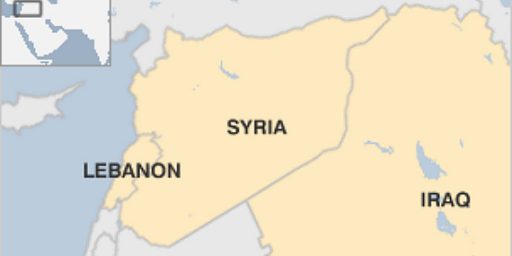Iran and Syria Helping Hezbollah Rearm
Thanks to help from their benefactors Iran and Syria, Hezbollah has rearmed to something approaching pre-war levels.
Iran is smuggling weapons through Syria to re-arm Lebanese allies Hizballah, despite renewed efforts by United Nations peacekeepers and the Lebanese army to seal off the mountain borders with Syria in the wake of last summer’s war between the Shi’ite militia and Israel, according to reports by Saudi and Israeli intelligence sources that have been confirmed by western diplomats in Beirut.
Israeli military officials in Tel Aviv say that Hizballah replenished nearly half of its pre-war stockpiles of short-range missiles and small arms. But western diplomats in Beirut say these calculations under-estimate the weapons flow and that Hizballah has now filled its war chest with over 20,000 short-range missiles—a similar amount to what they had at the start of the conflict, during which the group is believed to have fired over 3,000 rockets at Israel. “The Iranian pipeline through Syria was already working during the war,” despite constant Israeli bombing raids on the roads into Lebanon from Syria, this Beirut source said. Officially, Syria and Iran deny that they’re supplying weapons to Hizballah. As for the Shi’ite group itself, when asked about receiving a new shipment of arms from Syria and Iran, a spokesman told TIME, without elaborating, “We have more than enough weapons if Israel tries to attack us again.”
While worrisome, this is hardly surprising. By their very nature, UN peacekeepers are powerless to do much to stop determined nation states from smuggling weapons to terrorists. Only a military willing to use lethal force has any chance of success in such an endeavor and even then it is very difficult.
Still, this has broad implications even beyond the Israel-Hezbollah and Lebanon-Syria crises.
The Saudis, in particular, are alarmed at Iran’s spreading influence in Lebanon. “There has been a serious increase in (Iranian and Syrian) activity in the rearming of HIzballah,” says Nawaf Obaid, a Saudi security advisor who is managing director of the Riyadh-based Saudi National Security Assessment Project, a consulting group that advises the Saudi government. Obaid contends that “a huge stream of trucks” has been crossing the border from Syria into Lebanon, ferrying thinly disguised shipments of arms.
Moreover, Obaid says, the Iranian Revolutionary Guard and Iran’s Ministry of Intelligence and Security (MOIS) are using the Iranian embassies in Damascus and Beirut as command and control centers — an allegation that was also confirmed to TIME by Israeli military sources. Obaid says there appear to be direct communications links between the Iranians and Hizballah, via Hizballah officers working inside the Iranian embassy in Beirut, and Iranian officers in the field with Hizballah fighters; in the past, some Middle East analysts have rejected the popular notion that Hizballah takes direct orders from Iran.
Iran’s apparent efforts to destabilize Lebanon and to expand Shi’ite influence in Iraq and throughout the region are of major concern to the Saudi government, a leading power in the Sunni Muslim world that presumably would like to see the U.S. take a more active stance in Lebanon against its regional rivals. Obaid says that when Vice President Cheney visits King Abdallah bin Abd Al Aziz Al Saud Saturday in Riyadh, the Saudi king is expected to tell Cheney that “the Saudi leadership will not and cannot allow Iran, through Syria and Hizballah, to bring down the Lebanese government and overtake the levers of power in Beirut.” Obaid says the Saudi king is also expected to discuss with Cheney the kingdom’s worries about Iranian activity in Iraq and the Palestinian territories as well as its alliance with Syria.
Even aside from the logistics of the situation, with American forces stretched pretty thin in Iraq and elsewhere, the likelihood of the United States doing much about this situation is small. The Saudi government might be the only significant element in the Arab world that would welcome our intervention, even on the Sunni side of the conflict with the Shites. And given that the Shites are, by far, the majority of the population in Iraq, we can hardly fashion a solution there that is simultaneously “democratic” and does not have the Shia in charge.






The Saudis may be willing to lend their clout and a lot of money to keep Lebanon afloat and out of Syrian hands. Saudi King Abdullah married a Lebanese woman and has a mother from the Shammar tribe of Arabia/Syria, so he is very interested in what is happening there.
I believe that we would be making a mistake talking to the Syrians just after their latest political murder. It’s the UN Investigative Inquiry, it’s Lebanese democratic values, it’s autonomy for a beleaguered minority of Christians in the region, and it’s talking with a country that harbors terrorists like Kamel Mashaal, the terror-lord of Hamas, who calls the bombings in the West Bank and Gaza steps to destroy Israel.
Syria is trying to murder and blackmail its way back into the good graces of the US and UN. I could understand the feckless spineless UN bending under the pressure, but the US is perceived by the Christians in Lebanon as in some way their Guarantor, and the Cedar Revolution was the only unsullied plus for US diplomacy in the region until Syria ordered its Orcs to kill Hariri, Gemayel, and other Christian and Sunni leaders.
If the US doesn’t stand up for Lebanon, we might as well pack it in and abandon Israel as well. The message the US would be sending would be that Osama was right, Americans are not bloody-minded enough to stomach long-term military engagements and are isolationists at heart.
Beyond how stretched thin our forces might be I find it hard to imagine our withdrawing forces from Iraq to put them into service in Lebanon. It doesn’t seem to fit into the rhetoric of withdrawal.